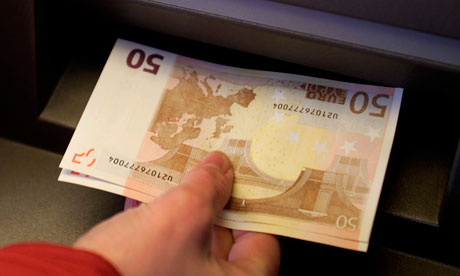Helena Smith in Athens and Jill Treanor
guardian.co.uk, Wednesday 16 May 2012 21.43 BST
Greece's savers making daily bank visits as analysts warn faster capital flight could push country out of euro before June's poll
Greeks are withdrawing large amounts of money fearing their country will leave the eurozone and return to the drachma. Photograph: Phil Noble/PA
Greeks have withdrawn €3bn (£2.4bn) from the banking system since the country's inconclusive elections on 6 May, with tellers saying savers were making two or three visits a day to local banks.
Savers fear Greece leaving the eurozone and returning to the drachma. An aide to the outgoing prime minister, Lucas Papademos, said there were "serious fears that the banks were running out of money".
Greece's president, Karolos Papoulias, warned on Monday that €700m had been withdrawn but said he had been assured by the governor of the Greek central bank, George Provopoulous, that there was no panic yet.
According to minutes of a meeting on Monday, Papoulias said: "Withdrawals and outflows by 4pm when I called him [Provopoulous] exceeded €600m and reached €700m. He expects total outflows of about €800m, including conversions into German bunds [bonds] and other such things."
Greeks have been slowly withdrawing cash from the banking system ever since the country first needed a bailout two years ago. Nearly a third of bank deposits were withdrawn between January 2010 and March 2012.
A crucial €18bn cash injection to stabilise Greece's banks has been held up at the European financial stability fund's Greek offshoot, the Hellenic financial stability fund (HFSF), for nearly two weeks with officials in Brussels refusing to release the funds because of the political instability in the wake of the elections. That had still not been released by tonight and is now not expected to be released for another four days despite the efforts of the Papademos government to expedite the recapitalisation of Greek banks.
The delay to the recapitalisation was said to have forced the European Central Bank to stop dealing with some Greece banks, leaving local banks to receive funding from the central bank until the banks received their cash injection.
Simon Ward, chief economist at the fund manager Henderson, said there had been a €11.7bn fall in Greek deposits in the first quarter. Domestic private-sector deposits stood at €170bn in late March, of which €66bn was in overnight deposits.
Ward warned this could be vulnerable. "It is reasonable to expect this instantly accessible cash to leave the Greek banking system amid current political and economic chaos, implying a heightened risk of deposits being frozen and/or redenominated in the event of EMU [economic and monetary union] expulsion," he said.
"Faster capital flight could push Greece out of the euro well before next month's elections, rendering current political manoeuvring irrelevant," Ward added.
Some bankers believe Cyprus will leave the eurozone at the same time as Greece and hope that contagion can be prevented from reaching other debt-laden countries such as Portugal when their people see the pain that the Greeks endure.
Anxiety about the strength of banks across Europe has reached the UK arm of Santander after local authorities – which lost money when Iceland's banks collapsed – queried the connections between the Spanish bank and its UK arm, which owns Abbey, Alliance & Leicester and Bradford & Bingley.
John Simmonds, head of finance at Kent county council, said he concluded that the UK arm of Santander was "rock solid" after talks with the bank following the council's decision to stop using the bank for overnight deposits. He had been reassured that the UK arm could only transfer money to Spain through dividends.
A Santander spokesman said: "Santander's UK business is strong and has a standalone credit rating which is one of the highest credit ratings of any UK bank."
Greeks withdraw €3bn in 10 days since election | World news | The Guardian
![The [Greek] European Tragedy](https://blogger.googleusercontent.com/img/b/R29vZ2xl/AVvXsEiWKI5s90SFm1wWTk6bs4p7CgslaC2SnYPsrZhb-B-smOufNNCSxCvpBLI9hOB-LsXZjir_PNmEiMk2-E62F3xkg96IoC6QFAaZAnPRTVH340IN9WBRmWJqPkjWlgyRj3zpALp7h6hvA58/s920/GkBack_new.jpg)
